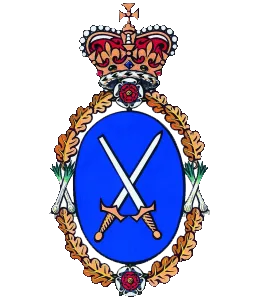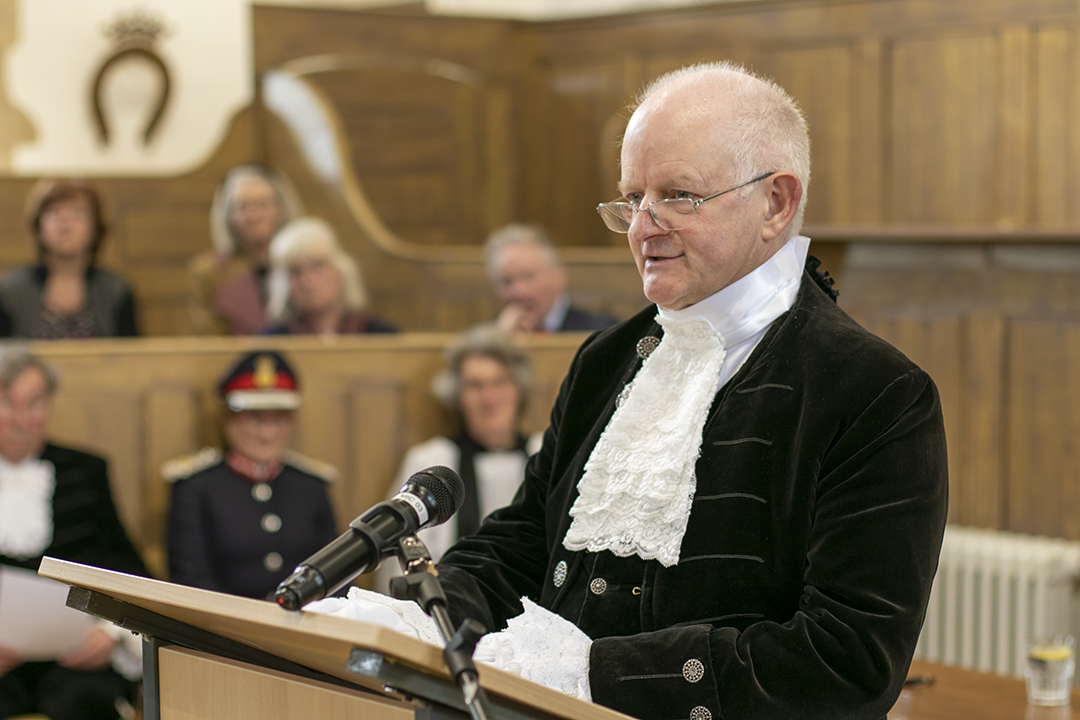High Sheriff
The Office of High Sheriff is a non-political Royal appointment for a single year. A nomination ceremony takes place annually on 12th November in the Royal Courts of Justice at which three names are put forward by the Queen’s Remembrancer for the office of High Sheriff in each county. Subsequently the selection of every new High Sheriff is made from those names in the Privy Council by the Sovereign who, by ancient custom, uses a silver bodkin to ‘prick’ a hole through a vellum scroll against the appointed name. Currently there are 55 High Sheriffs, many of whom are women, serving the counties of England and Wales.
High Sheriffs represent the Sovereign within their county in respect of matters relating to the judiciary and maintenance of law and order. In practice, most practical tasks are now delegated to the legal courts and the Chief Constable of Police, but formal responsibilities still include ensuring the well-being of High Court Judges on circuit, attending Royal visits to the county , acting as a returning officer for parliamentary elections, proclaiming the accession of a new Sovereign and attending various ceremonial functions.
Support is provided to the Judiciary, the Police, the Emergency Services, the Prison and Probation Services and to various other agencies involved in crime prevention, particularly amongst young people. Under the Criminal Law Act 1826, High Sheriffs have a responsibility to reward those who, in the opinion of judges at a criminal trial, have been particularly courageous in the apprehension of offenders. They also present awards to deserving individuals who have made outstanding contributions to their local communities or wider society.
HIGH SHERIFFS RECEIVE NO REMUNERATION AND REMAIN INDEPENDENT AND NON-POLITICAL, THUS ENSURING THEIR FREEDOM TO INTERPRET THEIR DUTIES AND SERVE THEIR COUNTY IN MANY DIFFERENT WAYS. INDEED THEY ARE POSITIVELY ENCOURAGED TO MAKE THE MOST OF THEIR INDIVIDUAL CAPABILITIES AND DEVELOP THEIR OWN INTERESTS. PREVIOUS HIGH SHERIFFS OF RUTLAND HAVE PLAYED, AND CONTINUE TO PLAY, SIGNIFICANT ROLES IN SUPPORTING MANY DIVERSE VOLUNTARY AND STATUTORY ORGANISATIONS.
Under Sheriff
Under the Sheriffs Act 1887, the High Sheriff has a legal duty to appoint an Under Sheriff. This is an annual appointment and the High Sheriff must by law, within one month of taking Office, give to the Queen’s Remembrancer details of the person they have appointed as their Under Sheriff. This is usually done at the time that the new High Sheriff makes the Declaration of Office.
The role of the Under Sheriff is to support, guide and deputise for the High Sheriff. The role is traditionally filled by a solicitor as the High Sheriff was previously responsible for law and order in their county. This included executing writs of possession where a plaintiff had obtained judgement and subsequently was able to seize assets situated in the county to satisfy that judgement – a High Sheriff would often need advice from a lawyer to do this. Although this role has passed to the court bailiffs there is still an element of legal support needed for the High Sheriff.
The Under Sheriff has a vital role in ensuring continuity and can give valuable advice to new High Sheriffs. He/she is familiar with the protocols of the Court and has considerable experience of ceremonial matters.
Chaplain
High Sheriffs traditionally appoint their own Chaplain in order to provide support and advice and for their assistance at shrieval church services and on other formal occasions.
High Sheriff’s cadet
The High Sheriff may also appoint a Cadet to assist them during the year. These are usually chosen from the police cadets





